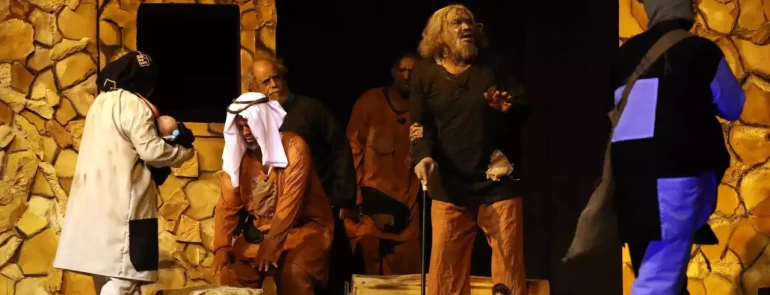For over a decade, the stages of Libya lay silent, echoing with the ghosts of conflict and uncertainty. The vibrant theatre scene, once a beacon of creativity and expression, had dimmed after the 2011 revolution, its curtains drawn by the turmoil that swept the nation. But in December 2023, a faint light flickered back to life. The National Theatre Festival, absent for 15 years, returned to Tripoli, marking a momentous comeback for Libyan theatre.

The festival, a symbol of unity and resilience, saw 19 plays grace stages across the capital and Misrata, weaving together threads of hope, healing, and defiance. Groups from across the country, bridging the east-west divide that has fractured the nation, converged to share their stories through movement, music, and spoken word. Each performance resonated with the complexities of Libya’s recent past and the yearning for a brighter future.
“Hassituha” (You Felt It), a haunting silent play from eastern Libya, embodied this sentiment. Dressed in white, actors mimicked the act of hurling invisible stones, symbolizing the pain and division wrought by years of conflict. The audience wept openly, recognizing the shared trauma etched into the performance. For many, it was a cathartic experience, a collective sigh of relief that the silence had finally broken.
Beyond the symbolic weight, the festival showcased the raw talent and resilience of Libyan artists. “Ajyal” (Generations), a group from Derna, a city still bearing the scars of a devastating flood, brought their play “Al-Hitan” (The Walls). It explored the themes of loss, rebuilding, and the enduring spirit of youth in the face of adversity. Their energy and passion electrified the stage, a testament to the unwavering spirit of Libyan theatre.

Challenges, however, remain. The infrastructure needs rebuilding, with many theatres still damaged or neglected. Funding is scarce, forcing artists to rely on self-sacrifice and community support. The security situation, too, casts a shadow, impacting audience turnout and travel between cities.
Yet, there are glimmers of hope. Young artists are finding creative ways to overcome these obstacles. Online platforms offer digital stages for their work, reaching audiences beyond physical limitations. Underground theatre spaces are burgeoning, fostering a vibrant off-circuit scene. Communities are rallying behind their artists, providing resources and moral support.
Perhaps the most significant change lies in the audience themselves. After years of yearning for normalcy, Libyans are embracing theatre as a space for catharsis, community, and critical reflection. The packed houses at the National Theatre Festival are a testament to this, signifying a renewed hunger for storytelling and shared experience.
Libya’s theatre is not merely staging a comeback; it is redefining itself. The plays of today grapple with the complexities of the post-revolution era, addressing issues of identity, political division, and social justice. They are platforms for dialogue, demanding accountability and envisioning a better future.
In this sense, the return of the National Theatre Festival is not just a cultural event; it is a political one. It is a declaration that Libyans, despite the hardships, refuse to be silenced. Through their art, they are reclaiming their narrative, forging a path towards healing and reconciliation, and writing a new chapter in the story of their nation.
Of course, the road ahead is long and arduous. The ghosts of the past still linger, and the challenges are considerable. But the curtain has risen, and the lights are shining again. Libyan theatre is back, and with it, a glimmer of hope for a nation in search of its voice. As the applause fades and the lights dim, one thing is certain: the show must go on, and the stage of Libyan theatre is once again a vibrant platform for dreams, defiance, and a nation finding its voice.

